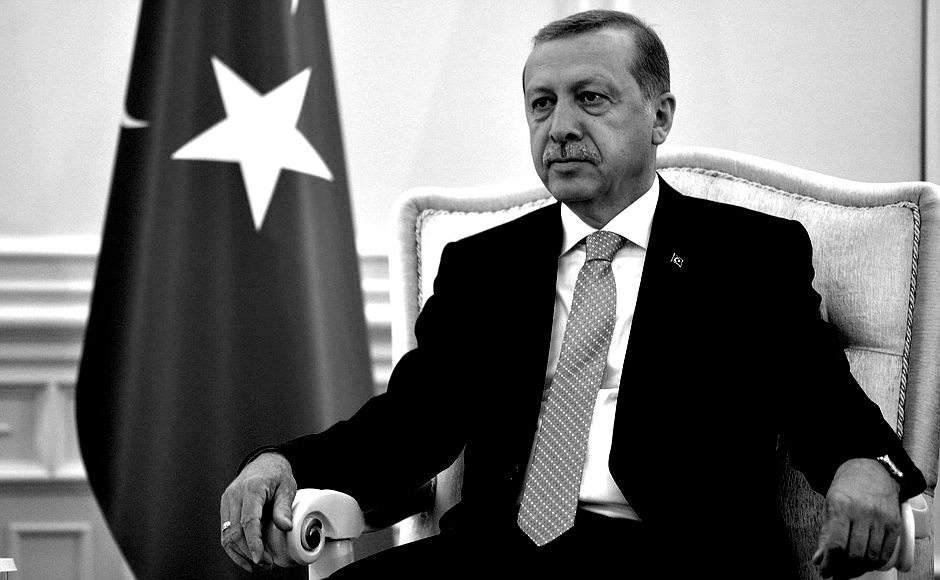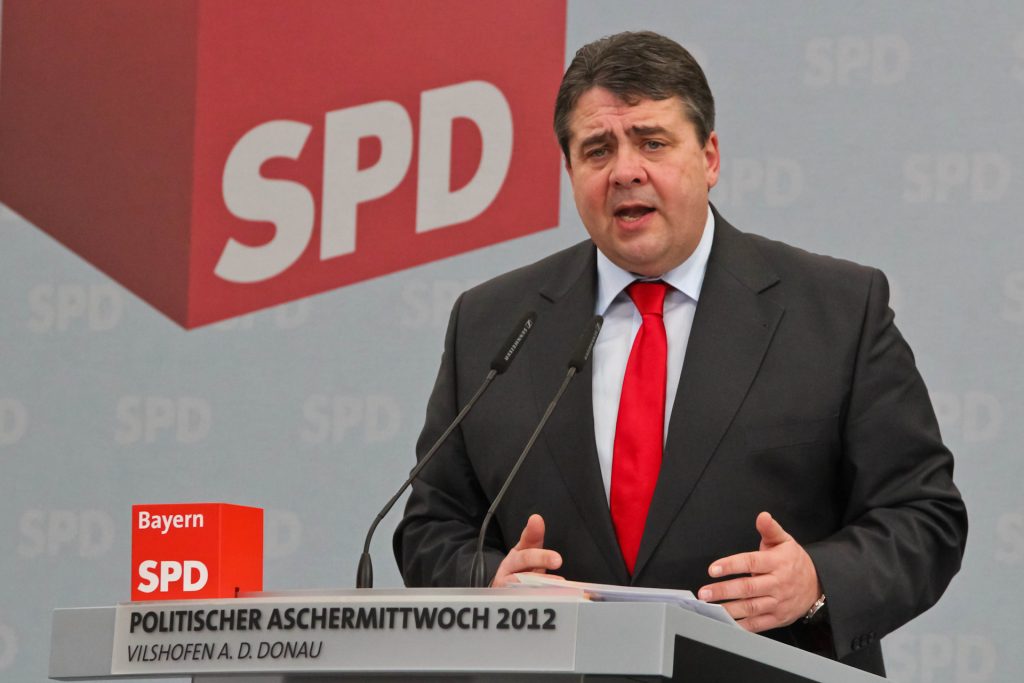Berlin Overhauls Turkey Policy
BERLIN, Germany (A.W.)—German Foreign Minister Sigmar Gabriel blasted Turkey’s ongoing crackdown on those in opposition to ruling President Recep Tayyip Erdogan, in a press conference on July 20, calling on the Turkish Government to return to a respectful dialogue “on the basis on European values,” as well as urging Turkish authorities to release wrongfully imprisoned German citizens.
The Minister accused Erdogan for wanting to “destroy the foundations” of rule of law and democracy in Turkey. “Someone who dismisses hundreds of thousands of civil servants, soldiers and judges, throws tens of thousands of people, including Members of Parliament, journalists and human rights activists, in prison, robs thousands of people of all their worldly goods by means of expropriation, closes down hundreds of press organizations, accuses dozens of German companies en bloc of helping terrorists—and by the way, does all this on unfounded grounds and without respecting the fundamental principles of the rule of law—and is now pleading the case for the death penalty, clearly wants to turn back the tides of time and to destroy the foundations of the rule of law and democracy that had only become so stable in recent years,” Gabriel said during the press conference.
According to Gabriel, German-Turkish relations have been under a great strain in recent times and that Turkey has “left behind” what NATO has always aimed to be an alliance of values. The Foreign Ministry also issued a travel warning after Turkish authorities detained human rights activists for alleged terrorist activity.
“One cannot advise anyone to invest in a country if there is no longer legal certainty there and even companies are being accused of supporting terrorists,” Gabriel said, adding that the German Government cannot continue to guarantee German corporate investments in Turkey. He also demanded the release of and “swift and fair” trials for Peter Steudtner, Deniz Yücel, Meşale Tolu, and other Germans accused of political crimes. (Gabriel’s comments can be read in its entirety below)
A day earlier, on July 19, a German Federal Foreign Office spokesperson issued a statement announcing that the Turkish Ambassador was summoned on the instructions of Foreign Minister Gabriel. “It was necessary to inform the Turkish Government directly, immediately, and unambiguously about the German Government’s outrage and lack of understanding, as well as its crystal-clear views and expectations, in the case of Peter Steudtner – and to do so without using diplomatic pleasantries,” a part of the statement read.
Steudtner and other German human rights activists have remained in custody, despite calls for their release German Chancellor Angela Merkel. Merkel called the detention “absolutely unjustified” and declared Germany’s solidarity with Steudtner and all the others arrested. “The German government will do all it can, on all levels, to secure his release,” she said in a statement.
Erdogan’s spokesman lashed out at Germany after Gabriel’s comments, saying Ankara could not accept such a stance. “It is not possible for us to accept statements aiming to blur the economic environment based on political motivation, we hope they turn back from this,” Ibrahim Kalin said at a news conference in Ankara.
***
German Foreign Minister Sigmar Gabriel on the Situation in Turkey
I discussed what I am about to tell you with the Chairperson of the Christian Democratic Union of Germany (CDU), Federal Chancellor Angela Merkel, and the Chairperson of the Social Democratic Party of Germany (SPD) this morning because naturally we wanted to agree with the heads of the SPD and CDU on what steps we are going to take in the Federal Foreign Office and to act in concert with the coalition government. I will of course also phone my colleague Horst Seehofer later on.
You can take it that everything I tell you now has been agreed both with Angela Merkel and Martin Schulz.
Peter Steudtner travelled to Turkey at the beginning of July to take part as a consultant in a seminar organized by a human rights organization on an island off Istanbul in the Sea of Marmara. The seminar was about cyber-security and how to deal with sensitive data about victims of human rights abuses.
Peter Steudtner is not an expert on Turkey. This was his first-ever visit to the country. He has never written anything about Turkey. He does not have close contacts with Turkish politicians, the opposition or civil society, and he has certainly never come to anyone’s attention as a critic of the conditions in Turkey.
And yet special units of the Turkish police including special prosecutors burst into the seminar on 5 July and arrested all ten participants for supporting terrorism. Following what felt like two endless weeks in police custody, Peter Steudtner and five other participants of the seminar have now been remanded in custody on the same charges.
These allegations are clearly unfounded and have been invented.
Peter Steudtner has become just one of 22 German nationals to have been imprisoned for political reasons in Turkey since the attempted coup, which fortunately failed. Nine Germans are still on remand in Turkey.
We regard their detention as excessive and illegal. In each case, we have had to fight for consular access, which is a right guaranteed under international law.
German-Turkish relations have been under a great strain in recent times.
In the past decades, there have been many good times, as well as not so good times, and misgivings, misunderstandings and prejudices exist on both sides to this day.
Despite all the obstacles and difficulties, we have always been able to take it for granted that there is a willingness to work together in a spirit of partnership and to do so on the basis of shared European values and the firm belief on both sides that the Turkish leadership sees itself as a member of the European family, also from a historical point of view, in NATO and in Turkey’s relations with the European Union and Germany.
Particularly because we are aware of the sensitivities and disappointments in Turkey as regards the protracted process of EU accession and the failed military coup, our priority has always been partnership and the willingness to engage in dialogue, as well as patience with our Turkish friends and NATO partners, even if this has not always been easy for us.
And this was not based on blind confidence or naivety, but rather the conviction that we need to do this because we want to prevent bridges from being burned and our shared interests from being harmed, not least for the millions of people of Turkish origin who have found a new home in Germany and who must not be allowed to end up between a rock and a hard place. They are our citizens. We are grateful to them for the contribution they have made and continue to make to our country’s development and prosperity.
Time and again, we have been patient, have held back and not retaliated in kind. Time and again, we have trusted that reason will prevail again and that we will find our way back to thriving relations. Time and again, we have been disappointed. Over and over, the next stage of escalation was scaled.
What is happening in Turkey is blatantly obvious.
Someone who dismisses hundreds of thousands of civil servants, soldiers and judges, throws tens of thousands of people, including members of parliament, journalists and human rights activists, in prison, robs thousands of people of all their worldly goods by means of expropriation, closes down hundreds of press organisations, accuses dozens of German companies en bloc of helping terrorists – and by the way does all this on unfounded grounds and without respecting the fundamental principles of the rule of law – and is now pleading the case for the death penalty clearly wants to turn back the tides of time and to destroy the foundations of the rule of law and democracy that had only become so stable in recent years.
Someone who detains law-abiding visitors to their country on the basis on outlandish, indeed absurd, accusations and throws them into prison has left European values behind.
By the way, I also believe they have left behind what NATO has always aimed to be an alliance of values.
The cases of Peter Steudtner, Deniz Yücel and Meşale Tolu stand for the ludicrous accusations of “terror propaganda” that clearly serve to silence all critics one can catch, including those from Germany.
And they stand for the injustice that can befall anyone.
So Martin Schulz is right – things cannot go on this way. We cannot continue as before. We need to be clearer than we have been so that those responsible in Ankara understand that this type of policy will have consequences.
That is why we will now need to look at how we adapt our policies on Turkey to this more tense situation.
I regard the following points as the most important.
One cannot advise anyone to invest in a country if there is no longer legal certainty there and even companies are being accused of supporting terrorists. For this reason, I do not see how we as the German Government can continue to guarantee German corporate investments in Turkey, if – as has happened – arbitrary politically motivated expropriations are not only a threat, but have actually occurred. We need to think about whether we should cap Hermes export credit guarantees. As regards investment loans from development banks such as the EIB, we now need to take a very close look at what is and isn’t possible.
Naturally, this also affects the question of how we deal in Europe with the EU’s pre-accession assistance to Turkey. We will need to discuss this in the coming days and weeks with our European colleagues.
Peter Steudtner’s case shows that German citizens are no longer safe from arbitrary arrest in Turkey. As a result, we have no other choice but to change our travel and security advice for Turkey and to inform Germans about what can happen to them if they travel to Turkey. The new travel and security advice is available on the Federal Foreign Office website.
SPD Chairperson Martin Schulz has also commented on topics such as the Customs Union – an interest that is of great importance to Turkey and at the heart of its own interests as regards the European Union. And I must say frankly that I, too, cannot imagine negotiations on expanding the Customs Union taking place if citizens of the European Union are being detained in prison at the same time and for no reason in Turkey. That is why I am in complete agreement with him.
We urgently call yet again on the Turkish Government to return to a respectful dialogue on the basis on European values.
We demand the release of Peter Steudtner, Deniz Yücel and Meşale Tolu, unlimited consular access, and swift and fair trials for them and the other Germans accused of political crimes.
We expect Turkey to return to European values and to respect for freedom of opinion, the press and the arts.
Relations with Turkey are very important to us. We remain interested in good relations with the Turkish Government based on trust. We want Turkey to remain part of the West. However, it takes two to tango.
At the moment, I do not see any willingness on the part of the Turkish Government to take this path with us. More’s the pity!

